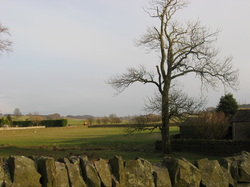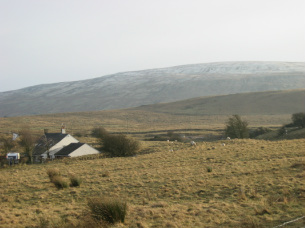Short Story Collection: Hello Goodbye

Kate says: Hello Goodbye is a collection of eighteen stories which explore the theme of loss and leave-taking. This theme seems to have emerged organically: perhaps this is the ‘persistent obsession’ that I am working to exorcise in my writing (Trevor 2009). Of course, the theme is a familiar one: literature demonstrates and plays to our fascination with final moments. Think, for example, of Hardy’s novels. Some of the stories here share Hardy's interest in place. The intensity of the short story, though, makes it particularly suited to an exploration of the transitory nature of human contact, what Nadime Gordimer called the ‘flash of fire-flies’ which illuminates the short story writer’s vision. The shorter stories here especially focus on a single moment of crisis and aim to capture that moment as if, according to that master of the form V.S. Pritchett, it were ‘glimpsed from the corner of the eye’.
|
KISS Come and sit down, pet, sit down darling, they said. How are you, how are you doing, are you doing ok, they said. We need to have a talk, they said. We want to have a chat with you. First of all, they said, we want you to know that we love you, we both love you, very very much. And, they said, we will always love you, whatever happens. We want you to try and remember that. Also, she said, we want you to understand that this isn’t – none of this is your fault. Isn’t that right, she said. That’s right, he said, we don’t want you to blame yourself for any of this. So, they said. The thing is. This is hard, they said. The thing is, you have probably noticed that we, your mother and I, he said, dad and I, she said, you’ve probably noticed we haven’t been getting on too well. We have – well, they said, there have been, you have probably heard arguments, shouting even. Well, not shouting, he said, but voices raised in anger sometimes you know. Yes, actually, shouting, she said. Anyway, it’s no good she must have heard it, haven’t you, she said. But the thing is, he said, the thing is, they said, we can’t go on like this. We have tried. Don’t think we haven’t tried to keep things going, to keep things ticking over, to hold it all together, they said. Because we’ve really tried, they said, tried everything we can think of, and it’s no use. It’s not that we don’t love each other, they said. We still love each other, she said. But in a different way, he said. So we’re going to try, we’re going to try a different – So dad’s going to stay with Dave for a bit, you know Dave the one he goes to the gym with. Just to see how it goes. Not separating, not splitting up exactly, just that he’s going to stay somewhere else for a while, we’ll live in different places for a while – well, Dave’s isn’t far, is it, they said. So you’ll still see him, you’ll still see both of us, of course, we’ll still both be your parents of course, so it’s not like a divorce or anything. And we’ll just see how it goes. And you know it might be better, better for all of us, you might like it better in fact. We don’t want you to worry, but we wanted to tell you so that you know what’s going on. And if you are worried or unhappy or anything, we want you to tell us. Because we want you to feel you can talk to us at any time. Because you are very precious to us, they said, our very special little girl. Ok? So give your dad a kiss goodbye. * Extract from FLORA The phone call came on the third night. After two days of calm, the storms had returned. Paul lay awake, listening to wind rattle the sides of the caravan, drumming thin rain onto the roof. He imagined them perched on the cliff edge, a millimetre from oblivion, needing only one strong gust to topple them over. Beneath the clatter outside, the slow wash of Jane’s breathing. She lay curled into him in the makeshift bed, her face on his chest, as she often did these days, as Flora had done when she was tiny. A day in July. Creamy surf on pale sand. Flora, in the frog t-shirt, runs to the water’s edge, hair flying. She turns and grins, shouts, but the wind carries her words away before Paul hears them. Paul woke to the foolish ringtone of Jane’s mobile. ‘It’s work,’ Jane said. ‘Dave from work.’ ‘Leave it,’ Paul said. ‘We’re on holiday.’ But Jane had already answered. Paul saw her frown, then watched her face collapse in on itself. A gulping, rasping breath as she handed him the phone. Three weeks ago. Flora’s telephone voice sounds distant. It is after midnight. He has been dozing in the chair, a book open on his knee. ‘Dad? I’ve been thinking.’ He yawns. ‘Ok. Are you ok? It’s late.’ ‘I’m fine. But I’ve decided to stay up here for now – not come home for Easter?’ ‘Mum will be disappointed.’ ‘I know. But can you explain to her for me? You know, work, and assignments and stuff – and I have exams in May.’ They talk, laugh. He dismisses the emptiness in his chest: too many late nights. Minutes later, Paul and Jane were in the car, hurtling east and north through the dark. They left the caravan where it stood looking over the bay. He was driving too fast, but the urgency to cover the hundreds of miles and arrive was stronger than sense. If only they could move fast enough, perhaps they could somehow overtake events and undo this unthinkable thing. On the way here, for a moment he had lost control of the caravan, its usual swinging to and fro lurching into a violent slew to the right, threatening to pull them across the carriageways or plummet them onto the hard shoulder, or both, one after the other in an arc of destruction. Jane had spoken his name before the thing righted itself then she’d sworn, and they’d looked at each other and laughed. Now she spoke his name again, splitting the single sound into multiple syllables, a rising note at the end. When he remembered this most terrible of journeys in the days and weeks ahead, he heard the squeal of tyres, the crazed insistence of the windscreen wipers through the sound of spilling water, and Jane’s voice, that sudden shriek, then a continuous thin wailing that dropped to a whimper. Soon she fell silent, her head turned into the seat away from him, neither sleeping nor crying, he thought, only staring out into the blackness... |
|

